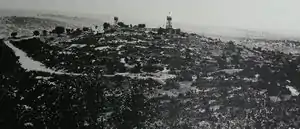1938 in Mandatory Palestine
Events in the year 1938 in the British Mandate of Palestine.
| 1938 in the British Mandate of Palestine | |||||
|
|||||
| |||||
Incumbents
- High Commissioner - Sir Arthur Grenfell Wauchope until 1 March; Sir Harold MacMichael
- Emir of Transjordan - Abdullah I bin al-Hussein
- Prime Minister of Transjordan - Ibrahim Hashem until 28 September; Tawfik Abu al-Huda
Events

Kibbutz Hanita, built in the Tower and stockade settlement method, 1938
- 4 January - The British government appoints the Woodhead Commission to explore the practicalities of the partition of Palestine.
- 10 January - James Leslie Starkey, a noted British archaeologist of the ancient Near East and Palestine who leads the first excavations in Tel Lachish, is killed by a gang of armed Arabs near Bayt Jibrin on a track leading from Bayt Jibrin to Hebron.
- 23 February - The Port of Tel Aviv officially opens, as a competing (Jewish) port to the port in Jaffa, the latter having been crippled by the Arab revolt and general strike since 1936.
- 1 March – Sir Harold MacMichael assumes office as the High Commissioner of Palestine.
- 21 March - The founding of the kibbutz Hanita
- 13 April - The founding of the moshav Shavei Tzion as part of the tower and stockade settlement scheme.
- 26 June - The founding of the kibbutz Alonim
- 29 June - Shlomo Ben-Yosef executed for ambushing an Arab bus near Safad.[1]
- 6 July - 18 Arabs and 5 Jews were killed by two simultaneous bombs in the Arab melon market in Haifa, 79 people were wounded.[2]
- 16 July - 10 Arabs were killed and 29 wounded by a bomb at a marketplace in Jerusalem.[2]
- 17 July - The founding of the kibbutz Ma'ale HaHamisha
- 25 July - The founding of the kibbutz Tel Yitzhak
- 25 July - 39 Arabs were killed and over 60 wounded by a second bomb in the Haifa vegetable market.[2]
- 16 August - Former Jewish policeman Mordechai Schwarcz executed for the murder of an Arab policeman
- 17 August - The founding of the moshav Beit Yehoshua
- 25 August - The founding of the kibbutz Ein HaMifratz
- 26 August - 24 Arabs were killed and 39 wounded by a bomb in the Jaffa vegetable market.[3]
- 30 August - The founding of the kibbutz Ma'ayan Tzvi
- 2 October - 1936–1939 Arab revolt in Palestine: In the 1938 Tiberias massacre, Arab rioters kill 19 Jews in the city of Tiberias, eleven of whom are children.[4] During the massacre, 70 armed Arabs set fire to Jewish homes and the local synagogue.
- 12 October - The British Government announces sending a further four battalions to Palestine.[5]
- 18 October - British army troops regain control of the old city of Jerusalem, which is occupied by Arab extremists in early October.
- 9 November - A technical British committee, known as the Woodhead Commission, rejected the Peel Commission partition plan mostly on the grounds that it could not be achieved without a large forced transfer of Arabs.[6] It proposed "a modification of partition which, ...seems, subject to certain reservations, to form a satisfactory basis of settlement", if the U.K is prepared to provide a "sufficient assistance to enable the Arab State to balance its budget".[6]
- 16 November - The founding of the moshav Sharona
- 17 November - The founding of the moshav Geulim
- 24 November - The founding of the kibbutz Eilon
- 25 November - The founding of the kibbutz Neve Eitan
- 25 November - The founding of the kibbutz Kfar Ruppin
- 29 November - The founding of the kibbutz Kfar Masaryk
- 22 December - The founding of the kibbutz Mesilot
Unknown dates
- The founding of the moshav Sde Warburg
- The founding of the moshav Ramat Hadar
Notable births
- 13 January - Yehoshua Porath, Israeli historian
- 24 January - Yoram Taharlev, Israeli poet, author, and comedian
- 30 January - Yoram Tsafrir, Israeli archaeologist (died 2015)
- 13 March - Dan Margalit, Israeli journalist
- 3 April - Boaz Moav, Israeli politician, academic, and activist (died 2002)
- 14 April - Rivka Michaeli, Israeli actress
- 1 July - Ilana Karaszyk, Israeli Olympic runner, long jumper
- 14 July - Moshe Safdie, Israeli-American architect and urban designer
- 21 July - Ya'akov Ahimeir, Israeli journalist and television and radio personality
- 3 August - Moshe Maya, Israeli rabbi and politician
- 29 August - Amnon Reshef, Israeli general
- 29 August - Ofer Bar-Yosef, Israeli archaeologist and anthropologist
- 3 October - Dan Bar-On, Israeli psychologist (died 2008)
- 29 October - Ralph Bakshi, Israeli-American director of animated and live-action films
- 4 December - Nava Arad, Israeli politician
- Full date unknown
- Amos Meller, Israeli composer and conductor (died 2007)
- Dan Meyerstein, Israeli chemist and resident of Ariel University
- Salman Abu-Sitta, Palestinian Arab researcher
- Naji al-Ali, Palestinian Arab cartoonist (died 1987)
- Ahmed Jibril, Palestinian Arab, founder and leader of the militant group PFLP-GC
- Abu Ali Mustafa, Palestinian Arab, member of the PLO executive (died 2001)
References
| Wikimedia Commons has media related to 1938 in the British Mandate of Palestine. |
- Marlowe, John (1946) Rebellion in Palestine. The Cresset Press, London. pp. 198,199.
- Marlowe. p.200
- Marlowe. p.201
- League of Nations Archives
- Marlowe. p.203
- "Woodhead commission report".
This article is issued from Wikipedia. The text is licensed under Creative Commons - Attribution - Sharealike. Additional terms may apply for the media files.

